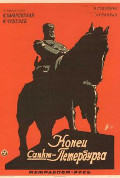
Directed by
Vsevolod Pudovkin
88 minutes
Rated PG
Reviewed by
Bernard Hemingway


The End Of St Petersburg
Pudovkin's second feature film (credit should also be given to co-director Mikhail Doller) was intended for a theatrical release to coincide with the Soviet Union's 10th Anniversary celebrations of the 1917 October Revolution.
It is a very different film to Eisenstein's October (1928), which dutifully concentrated on class struggle politics, and although Pudovkin originally wanted a more epic scale than realised in the film's final cut, the scaled-down result is a powerful drama which even today and being a silent movie (a musical score by Russian composer Vladmir Lurovski was added for the film's 1969 restoration and re-release) impresses for its emotional commitment and visual sophistication.
Using a conventional narrative format the film, scripted by Nathan Zarkhi, follows the path of The Village Lad (Ivan Chuvelev) from grinding rural poverty to urban political consciousness and effectively uses Eisensteinian montage to give an account of the financial and political cynicism of the bourgeois Menshevik Coalition government and the eventual Bolshevik takeover.
Want something different?





